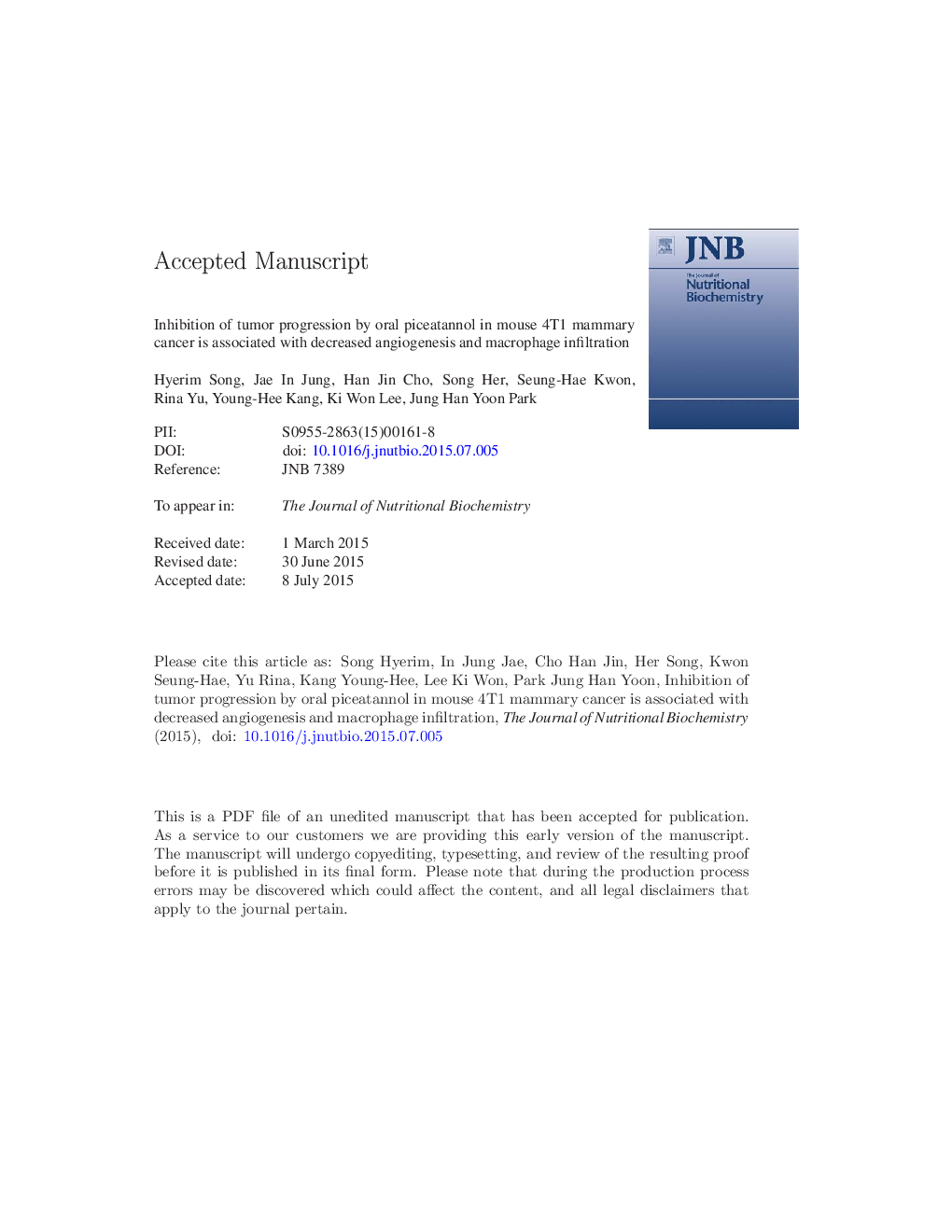| کد مقاله | کد نشریه | سال انتشار | مقاله انگلیسی | نسخه تمام متن |
|---|---|---|---|---|
| 8336844 | 1540643 | 2015 | 33 صفحه PDF | دانلود رایگان |
عنوان انگلیسی مقاله ISI
Inhibition of tumor progression by oral piceatannol in mouse 4T1 mammary cancer is associated with decreased angiogenesis and macrophage infiltration
دانلود مقاله + سفارش ترجمه
دانلود مقاله ISI انگلیسی
رایگان برای ایرانیان
کلمات کلیدی
M-CSFHIF-1αMVDMCP-1iNOSMMP-9COX-2VEGFRCD31TREM-1TIMP-2FBSDMEMPiceatannolCDKTAMsDulbecco′s modified Eagle′s mediumSTAT - آمارtumor angiogenesis - آنژیوژنز تومورMicrovessel density - تراکم MicrovesselEnzyme-linked immunosorbent assay - تست الیزاELISA - تست الیزاTUNEL - تونلBreast cancer - سرطان پستانfetal bovine serum - سرم جنین گاوinducible nitric oxide synthase - سنتاز اکسید نیتریک القاییCytokines - سیتوکین هاCyclooxygenase-2 - سیکلوکوکسیژناز2Vascular endothelial growth factor - فاکتور رشد اندوتلیال عروقیVascular Endothelial Growth Factor (VEGF) - فاکتور رشد اندوتلیال عروقی (VEGF)Matrix metalloproteinase-9 - ماتریکس متالوپروتئیناز -9macrophage colony-stimulating factor - ماکروفاژ عامل کلونی تحریک کنندهMacrophages - ماکروفاژها،درشت خوارهاTumor-associated macrophages - ماکروفاژهای مربوط به تومورSignal transducer and activator of transcription - مبدل سیگنال و فعال کننده رونویسیplatelet endothelial cell adhesion molecule-1 - مولکول چسبندگی سلول اندوتلیال پلاکتی-1hypoxia-inducible factor-1 alpha - هیپوکسی القاء عامل 1 آلفاpolymerase chain reaction - واکنش زنجیره ای پلیمرازPCR - واکنش زنجیرهٔ پلیمرازMonocyte chemotactic protein-1 - پروتئین chemotactic monocyte-1cyclin-dependent kinase - کییناز وابسته به سیکلینVEGF receptor - گیرنده VEGFtriggering receptor expressed on myeloid cells-1 - گیرنده ای که به سلول های میلوئید واکنش نشان می دهد -1
موضوعات مرتبط
علوم زیستی و بیوفناوری
بیوشیمی، ژنتیک و زیست شناسی مولکولی
زیست شیمی
پیش نمایش صفحه اول مقاله

چکیده انگلیسی
Piceatannol, a polyphenol which exhibits anticancer activities, is found in grapes, red wine and berries. It has been shown to inhibit several transcription factor pathways. The present study was conducted to determine whether oral administration of piceatannol inhibits mammary tumor progression. 4T1 mammary carcinoma cells were injected into the mammary fat pad of syngeneic female BALB/c mice. Starting 1 day later, piceatannol (10- or 20-mg/kg body weight/day) was administered by oral gavage for 30 days. Piceatannol treatment reduced tumor growth. In tumor tissues, piceatannol treatment reduced the expression of transcription factors P-NFκB p65, P-STAT3 and HIF-1α and multiple proteins involved in regulation of cell cycle progression (Ki67, cyclin D1, cyclin A, CDK2, CDK4), angiogenesis (VEGF-A, VEGFR-2, VE-cadherin, CD31) and lymphangiogenesis (VEGF-C, LYVE-1), as well as macrophage infiltration. Piceatannol significantly increased apoptotic cells and expression of both Bax and cleaved caspase-3 but reduced Bcl-2 expression in tumor tissues. In addition, piceatannol reduced the number and volume of pulmonary tumor nodules and expression of MMP-9 in both lung and tumor. It also reduced tissue levels of cytokines/chemokines, including M-CSF and MCP-1. In vitro results revealed that piceatannol inhibited migration of 4T1 cells and monocytes, as well as secretion of MCP-1 and M-CSF by 4T1 cells. 4T1 cell-conditioned medium stimulated monocyte migration, which was suppressed by a CCR2 antibody. These results indicate that alteration in tumor microenvironment (macrophages, transcription factors, etc.) is an important mechanism by which piceatannol inhibits tumor proliferation, angiogenesis and lymphangiogenesis, leading to suppression of mammary tumor growth and metastasis.
ناشر
Database: Elsevier - ScienceDirect (ساینس دایرکت)
Journal: The Journal of Nutritional Biochemistry - Volume 26, Issue 11, November 2015, Pages 1368-1378
Journal: The Journal of Nutritional Biochemistry - Volume 26, Issue 11, November 2015, Pages 1368-1378
نویسندگان
Hyerim Song, Jae In Jung, Han Jin Cho, Song Her, Seung-Hae Kwon, Rina Yu, Young-Hee Kang, Ki Won Lee, Jung Han Yoon Park,